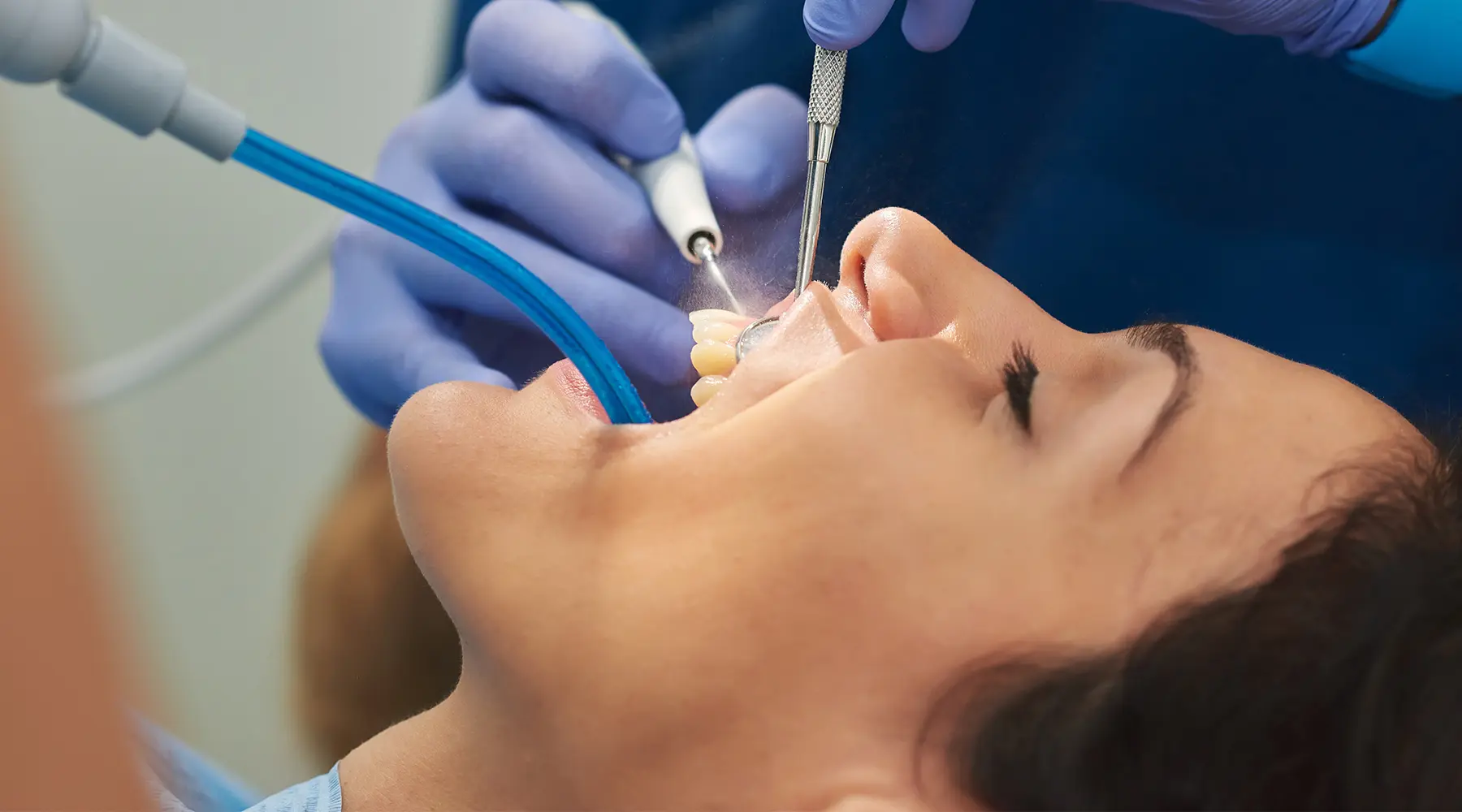Reviewed By Dr. Tyler N Davis, DMD
Reading Time: 4 minutes
If your dentist recently recommended a dental deep cleaning, you might wonder how it differs from your usual regular teeth cleaning.
Both are important for oral health, but they serve different purposes.
Let’s break down the key differences, procedures, and what you need to know.
Table of Contents
Key Takeaway
PDental deep cleaning addresses gum pockets and root surfaces to treat periodontal disease and restore gum health.
Regular cleaning removes plaque and tartar above the gum line to prevent gingivitis and maintain a healthy smile.
Quick Answer: What’s the Difference?
- Regular cleaning (Prophylaxis): Focuses on preventing gum diseases by removing plaque and tartar buildup from visible surfaces of teeth. It’s a routine, preventive procedure. Only performed on patients with healthy bone.
- Deep cleaning (Scaling and root planing): Treats existing periodontal disease (bone loss) by cleaning below the gumline, targeting tooth roots and gum pockets. It’s therapeutic and stops the progression of gum disease/bone loss..
Regular Teeth Cleaning
During a standard dental cleaning, a dental hygienist or dentist uses dental scalers and possibly ultrasonic scalers to remove plaque and tartar from your teeth.
They will then polish your teeth with a gritty fluoridated polish and sometimes finish with a fluoride treatment to strengthen enamel.
Goal:
- Prevent gingivitis (early gum inflammation).
- Maintain healthy teeth, gums, and bone.
- Remove surface stains for a brighter smile.
Frequency:
Every 6 months for most people, or more often if you are prone to tartar build-up.
Who needs it?
Anyone with generally good oral hygiene and no signs of advanced gum disease.
Dental Deep Cleaning
A deep teeth cleaning involves two steps:
- Scaling: Removing stubborn tartar and bacteria from below the gum line, including root surfaces and periodontal pockets.
- Root planing: Smoothing rough spots on the roots to prevent bacteria growth and help gums reattach to teeth.
Local anesthesia is often used to keep you comfortable. The process may take 1–2 visits.
Goal:
- Prevent bone loss and tooth loss caused by severe gum disease
- Reduce gum pocket depths to prevent infection
- Restore gum health and prevent systemic health issues like heart disease
Frequency:
Typically a one-time procedure, followed by periodontal maintenance every 3–4 months. To learn more about this procedure, read: How Often Do You Need Scaling and Root Planing?
Who needs it?
Patients with:
- Gum pockets deeper than 4mm
- Bleeding gums, loose teeth, or bad breath
- Bone loss visible on X-rays
Key Differences at a Glance
| Factor | Regular Cleaning | Deep Cleaning |
| Purpose | Prevention | Treatment for gum disease |
| Target area | Above the gumline | Below the gumline (tooth roots) |
| Procedure | Scaling, polishing, fluoride | Scaling + root planing |
| Anesthesia | Rarely needed | Often used |
| Frequency | Every 6 months | As needed (based on gum/bone health) |
| Cost | Usually covered by insurance | May cover half the cost of the treatment |
When Is a Deep Cleaning Needed?
Your dentist may recommend it if you show signs of periodontal disease, such as:
- Persistent bad breath
- Gum recession or sensitive teeth
- Bleeding while brushing and flossing
- Loose teeth or pain while chewing
Wondering if gum disease can be reversed? Check out our blog: Can Gum Disease Be Reversed? Gum Disease Explained
What to Avoid After a Deep Cleaning
To promote healing:
- Avoid hard, crunchy, or sticky foods for 2–3 days (e.g., nuts, popcorn).
- Skip hot/cold beverages if you have sensitive teeth.
- Don’t smoke—it slows healing and increases risk of infection.
- Vigorous brushing/flossing near treated areas for a day.
- Avoid alcohol-based mouth rinses; opt for a saltwater rinse instead.
Top Dental Care in the Phoenix East Valley AZ – Schedule Your Visit Today!
While regular cleanings are essential for maintaining a healthy smile, deep cleanings are necessary to reverse gum disease and protect your overall health.
If your dentist recommends this treatment, don’t delay!
At Power Road Dental Care, we offer scaling and root planing procedures. Our skilled team of dental professionals is dedicated to delivering top-quality oral care, using the latest techniques and technology.
If you are in the Phoenix East Valley, book an appointment at our dental office in Mesa, AZ, call (480) 664-1438 or visit us at 2500 South Power Road, Suite 102, Mesa, AZ.
FAQs
Is deep cleaning painful?
Most patients feel minimal discomfort thanks to local anesthesia. Post-procedure soreness can be managed with over-the-counter pain relievers.
How long does it take?
A single visit lasts 1–2 hours, but severe cases may require multiple appointments.
Will my insurance cover it?
Many dental insurance plans partially cover deep cleanings if medically necessary. Check with your provider.
Are there risks?
Temporary gum tenderness or tooth sensitivity is normal. Rare risks include infection, which is preventable with proper oral care.
How do I know which type I need?
Your dentist will assess pocket depths, dental history, and X-rays to recommend the right type of cleaning.
Can I prevent gum disease?
Yes! Brush twice daily, floss, attend routine appointments, and address risk factors like smoking or poor diet. Check out these 5 Tips To Promote Healthy Gums.

